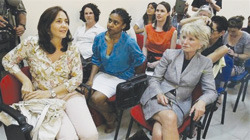
As New Zealand continues to become more diverse the state must involve minority groups in public policy practices. That is the foundation of Dr Rachel Simon-Kumar’s research, which was awarded a three-year government funded Marsden grant of over $300,000 (2009-2012).
The Waikato University senior lecturer’s project, ‘Engaging Women and Migrants in Public Policy Making’, is about understanding and making government more relevant to an increasingly more diverse New Zealand. Her research will address the role minority groups, particularly new migrants, Māori, and women, play in the machinery of policy making, and how their involvement in the process enriches and recognises New Zealand’s diverse society.
“In recent years, the New Zealand public sector has changed the way it makes policy for minority groups. There are greater efforts to make policy “inclusive” – by consulting with them, or working in partnerships with communities, for example.”
“What this research does is see how effective this process has been – do minority groups feel empowered by their involvement in policy? Are their voices being heard? Is policy more sensitive to the particular needs of minority groups?”
Dr Simon-Kumar sees her research as being a vision of New Zealand’s future. Having a vast background in the public sector, she has wanted to research in this area for a long time and hopes her research will make government more relevant to minority groups.
“In the end, this research – by studying these “inclusive” methods of policymaking – broaches wider questions about diversity and democracy in New Zealand in the 21st century. “
Abstract
Forming “partnerships”, “consulting”, “networking”, and building “relationships” – these are the bywords of a new generation of the New Zealand public policy practices and, it seems, the new face of New Public Management (NPM). Interestingly, relationships-based policy was advocated since the 1980s by feminist scholars as a means to bridge the gap between the state and socially marginalised groups. Against the backdrop of NPM, relational policymaking is an anomaly; these inclusive – indeed, feminised? – practices exist against a dominantly masculinist organisational culture and state ideology that are contrary to values of equity. If, in the past, policy tended to exclude marginal voices, today it is the terms of inclusion that need to be scrutinised. The proposed project seeks to examine the NZ state’s use of relational policymaking with marginalised groups. The core questions it asks are: What are the ideological contexts for relationship-based policy making in contemporary public sector practices? Do they contradict or further goals of inclusive democracy for marginalised groups/interests?
The questions raised here – about state practices and inclusiveness – are fundamental to the challenges of diversity in New Zealand today. The state is still the central locus where responsiveness to minority voices is ‘managed’. By employing feminist frameworks, the study goes beyond examining if relational practices ‘work or not’ to interrogating relationships between the neo-liberal state and marginal citizens in terms of meanings, ideologies, and rights/claims/obligations. Theoretically, the study will offer critical, particularly critical gendered perspectives, to the body of work on NPM, where such contributions are still nascent.
The core question will be addressed through the empirical analyses of two policy cases: (a) The New Zealand Settlement Strategy (2003), aimed at new migrants, and (b) The Action Plan for New Zealand Women (2004). Both policies share commonalities: they set the agenda for a series of actions with non-mainstream groups, and they were designed following extensive consultation. In language, implied rhetoric and practice, both these policies symbolise relational-based policy. The analysis of the policy cases has the following aims:
- to identify the use of relational practices in the policy-making process;
- to examine policy makers’ and stakeholders’ interpretations of relationships-based practices in these policies, and their expected purpose and outcomes;
- to explore the significance of these practices in the broader context of equity and power in the relationship between state and marginalised groups.
The case studies will be based on the qualitative analysis of policy documents, wider media texts, and interviews with policy makers and the spectrum of stakeholders involved in the design and implementation of these policies, and specific projects derived from these broader policies.